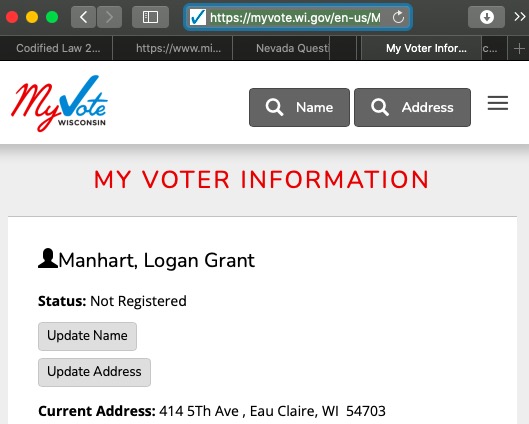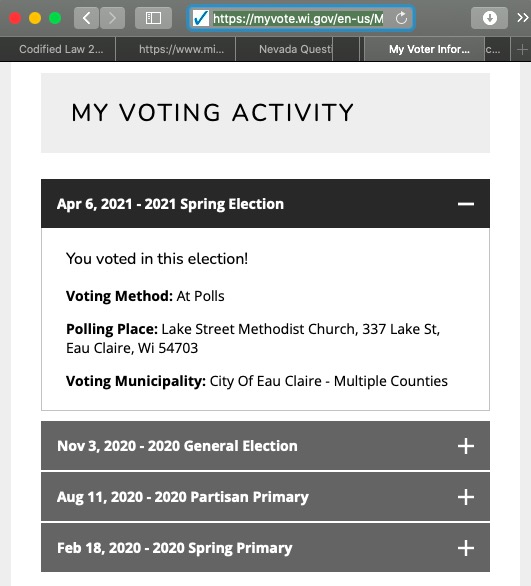The press and the court may catch up with Wisconsin voter but South Dakota House candidate Logan Manhart. Last week I reported that Manhart, who spent a lot of 2021 politicking in Wisconsin, who voted in Wisconsin’s April 2021 election, and whose Wisconsin voter registration was still active as of May 5, 2022, had broken the law when he filed his declaration of candidacy. In that declaration at the top of his nominating petition, Manhart swore that he was eligible to seek the office of South Dakota Representative. But legislators have to have resided in South Dakota for two years preceding the election in which they are candidates. Voting in Wisconsin on April 6, 2021 means Manhart was a legal, voting resident of Wisconsin until at least that date, which is only 1.6 years before the November 8, 2022, general election at which Manhart seeks District 1’s votes, which means Manhart lied on his nominating petition and invalidated his candidacy.
Former District 1 legislator and current District 1 House candidate Steven McCleerey is now taking that argument to court:
…a complaint filed with the Brown County Sheriff’s Office this week contends that the Bath man has not lived in South Dakota for the two years that the state Constitution requires before someone is eligible to serve in the state Legislature.
It alleges that Manhart, 23, participated in Wisconsin elections as recently as April of 2021.
The plaintiff in the case is Steve McCleerey, a former lawmaker who’s among two Democratic candidates in the District 1 contest [Joe Sneve, “Complaint Alleges Aberdeen-Area Republican Logan Manhart Skirted Eligibility Rules,” Sioux Falls Argus Leader, 2022.05.16].
Alleges? I called the Eau Claire city clerk last week, and she confirmed that Manhart voted in Wisconsin’s April 6, 2021, spring election. Manhart’s voter record at myvote.wi.gov shows his registration has gone inactive since our conversation last week, but the online voter portal still shows that Manhart voted at the polls at Lake Street Methodist Church, 337 Lake St, Eau Claire, WI 54703.


Manhart didn’t just skirt an eligibility rule. He lied under oath and broke the law. In some places, lying under oath is considered an impeachable offense.
Through his inattention, Manhart has saddled the Republicans with an unviable candidate. If a judge looks at the plain facts of this case and declares Manhart’s candidacy invalid, Manhart costs his party a shot at a District 1 House seat. Under state law, parties can only fill vacancies on the ballot that arise due to death or withdrawal of a candidate. If Manhart is truly a good party boy, he’ll run to the courthouse Tuesday morning and withdraw his candidacy, before any judge can pronounce on his all-too-brief South Dakota residency. Then GOP leaders in Roberts, Marshall, Day, and Brown counties would get a chance to fill the vacancy caused by Manhart’s lawbreaking with and honest, legal Republican candidate.
It should NOT require a lawsuit to pull an ineligible, lying dolt from a ballot.
The Secretary of State and the auditors of the affected counties have a DUTY, a solemn obligation to administer clean, legal, proper elections.
The Secretary of State and the auditors of the affected counties are the aiding and abetting criminals here for neglectful due diligence in printing ballots with the liar’s name. Hold them accountable November 7th.
Pre-primary Manhart is not the Republican nominee. Can the party really replace a candidate who has not earned the party nomination?
That Constitutional residency requirement may be anachronistic, but it is still there. He did lie under oath. Manhard should be off the ballot.
The Legislature should take a look at revising that section of the Constitution. I argue that a one year residency for legislative office is more in line with modern times. When that section of the Constitution was penned, South Dakota’s Legislature met every two years. It made some sense for new residents to cycle through one session before being eligible for office. But annual sessions of the Legislature have been the practice now for decades. It’s time to bring that part of the Constitution in line with the times.
Nick, I’m still looking for a firm answer on that question. The plain text of the statute refers to vacancies that occur from death or withdrawal after a primary. The primary hasn’t happened yet, so you’d think that the party’s replacement power wouldn’t exist yet.
However, SDCL 12-6-9 says candidates with no primary opponents are automatically the nominees. So, legally, yes, Manhart and St. John are the nominees of the GOP for District 1 House right now. SDCL 12-6-55 says any person nominated may withdraw not later than the first Tuesday in August.
So what confuses me is how the phrase “after a primary election” applies in a situation where the unopposed candidates were automatically nominated without a primary.
The South Dakota Democratic Party announces that it is a co-plaintiff with McCleerey. SDDP chairman Randy Seiler lowers the boom on Manhart’s fraud:
Democrats believe we are a nation of laws. Republicans Like Manhart think fraud is just something to shout when elections don’t break their way but something they can commit to take power.
Without a doubt, and if election integrity means anything, Manhart is off the ballot, with possibly conflicting statutes it might take a Supreme Court ruling to sort things out as to the appointment of a replacement.
Election integrity—vitally important phrase, Nick. If that phrase resonates at all with Logan, now that he has been informed of his violation and his ineligibility for office, he will act with integrity and immediately withdraw his illegal candidacy.
The declaration of the candidate on the nominating petition only states he, the candidate, resides in the district. The candidates only have to be eligible, by virtue of residency in the district, to be candidates. It doesn’t say anything about being eligible to hold the office sought.
The requirement for two years’ residency seems to be for holding the office, not running for it.
So it may be possible that a person who is ineligible to serve may still legally run as a placeholder in the primary.
I see it as a variation of a hog house bill. Pretty funny.